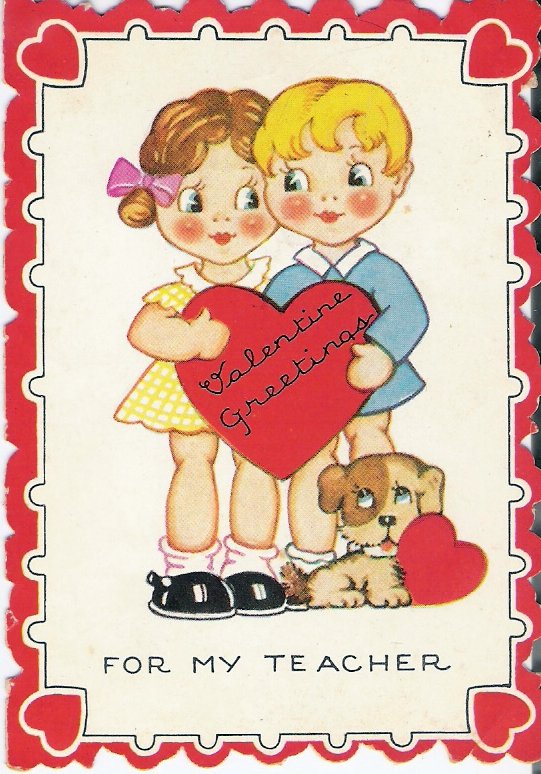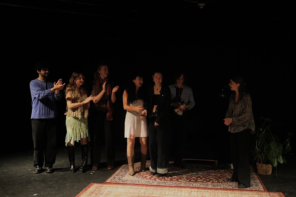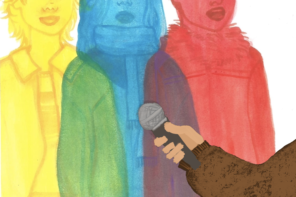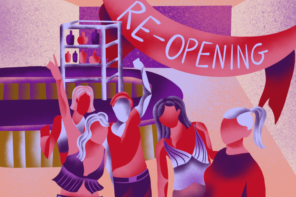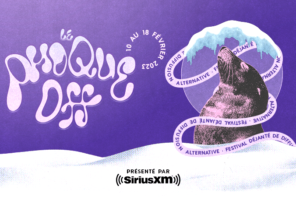With Valentine’s Day around the corner, it’s hard not to acknowledge the impact remote learning has had on students’ ability to form connections with other members of the McGill community. This is especially true when it comes to getting to know professors.
The Bull & Bear interviewed three McGill professors about their undergraduate experiences with love and romance. Professors are human, too — and these stories, ranging from not-so-romantic homemade meals to getting matching tattoos with a lifelong best friend, remind us just that.
Professor Kelly Gordon
With a tie-dye hoodie and perfect messy bun, Assistant Political Science Professor Kelly Gordon offered News Writer Tali Pukier a perspective of love in undergrad that wasn’t far off from the reality many undergraduate students face today.
B&B: What does Valentine’s Day mean to you?
Gordon: Being who I am and teaching the things I do, I was always highly critical of this romanticized idea of Valentine’s day: its heteronormativity and its celebration of a very particular kind of relationship and love. So, I’ve really enjoyed watching over the last few years this moving trend towards “Galentine’s Day,” where you celebrate other kinds of love.
I think young people are so much smarter about the different forms of important relationships that one can have throughout one’s life. There are so many times where we celebrate romantic love. Not to say that I didn’t have meaningful romantic relationships, but I like the idea of celebrating other forms of relationships. Whether that’s a relationship you have with your mom, or your best friend — these are all important relationships to celebrate as well. I have never, ever celebrated Valentine’s Day in a romantic way. I can’t. It’s too cheesy!
B&B: What was the social scene like during your Undergrad?
Gordon: What was the scene like? Okay. Well, I frequented the campus bar a lot on Thursday nights, which was the big night. Is Thursday still a big night for you?
B&B: It is, yes!
Gordon: So, that was a lot of my social scene. I basically had a series of insignificant, not particularly meaningful relationships throughout my undergrad. Some of my most significant relationships and ones that have been the most meaningful to me have been friends and other women. When I think about love and the relationships I have across all my schooling, it’s those that I think about.
Some of my most significant relationships and ones that have been the most meaningful to me have been friends and other women.
B&B: What was the culture around relationships (romantic or not) during your undergrad?
Gordon: I don’t know how many people meet and date in a big lecture class, but there is something so cool about going to lecture with your coffee and seeing other students and making friends throughout the Semester. I feel so bad for students now. We will do that again, you know?
For me, the deepest connections I’ve made have been from seminars. When I was doing my masters, I was, you know, super green, and I went to my first seminar on feminist theory. I immediately saw this girl from across the table, and I’m from Alberta, she was from Alberta, and she just seemed so cool and so smart, and I remember it took me a couple of weeks to even sort of befriending her. Now we are super close; we actually have matching tattoos! She was hugely influential–– I don’t think I’d be an academic if it wasn’t for her.
B&B: You had social media in your undergrad as well. Would you mind touching on the similarities or differences of social media during your undergrad, and what you perceive those impacts to be?
Gordon: So, [one] thing about social media between my generation and your generation is when Facebook first happened, it was only for university students. Nobody knew what it was or what it would become, so people put anything on there. Whatever they would share with their friends, they’d put online. There was no filter. Nobody knew what was coming. It was a space to share messy pictures from going out. Now, students are so smart, they only put professional pictures on there.
B&B: Do you have any funny, relatable stories or anecdotes from failed relationships?
Gordon: Oh my god, I have so many unproud moments. So. Many. I dated somebody who had a longboard — I feel like that’s pretty embarrassing, you know? I feel like I was so much less mature than undergrads at McGill.
B&B: Did you ever go on the longboard?
Gordon: No! One time he was on his longboard, probably under [the influence of] some substance. His friend was driving next to him, and he sort of grabbed the side of the car, and you know, ended up in the hospital, I think.
B&B: Any advice for students as Valentine’s day approaches?
Gordon: I don’t think your early twenties are necessarily the times to have serious relationships. Now that I’m in my thirties, life gets serious! I think that with social media now, the stakes feel high for students–– everything is so public. I actually think students are good at [living their lives offline], but don’t take yourself too seriously. I didn’t take myself too seriously in my early twenties, and well, I don’t take myself that seriously now, but I liked the experience that I had, which was you know, going out, making friends and doing… work? I found what I was passionate about through friends and other students.
Professor Jason Opal
Associate History Professor and Department Chair Jason Opal sat down with News Editor Andie Habert to discuss his undergrad experiences with Valentine’s day at Cornell University. Professor Opal joined us over Zoom from what has become one of his typical Zoom backdrops over the course of this year: the royal blue wall in his Montreal kitchen.
B&B: To begin, can you tell me a bit about your undergrad experience?
Opal: Sure. I went to Cornell University in upstate New York. I was there beginning in 1994 and graduated in 1998. I was interested in biology, so I studied that a little bit, but I’ve wanted to be a history professor since I was 12. So I mostly studied history, and I did a minor concentration in law, so I did a class at the law school as well. But I knew I wanted to be a history professor, so literally, the first time I met with an advisor, I told them that that was my plan, and they told me that I would need straight A’s, and you know it was pretty clear that I was set on my goal.
B&B: So apart from the academics, what was the social scene like? I think it’s hard for students to imagine a time when the internet and cell phones didn’t control social gatherings to an extent.
Opal: You know, Cornell is a really interesting place. It’s in a town in the middle of nowhere, but it’s this really huge University that’s a very vibrant place, but it’s very divided. So part of Cornell is this very club-scene type place, very strongly influenced by New York City and Long Island–– it’s like an island of New York city in Ithaca, New York. Then the rest of the University is much more diverse, there’s this cool agriculture group from upstate New York, which is how my dad got to go to Cornell, so there are these two worlds. There’s the hard-partying, New York City club scene for about half of Cornell, and then the rest of Cornell was all different kinds of people, much more nerdy and academic.
B&B: Where did you see yourself falling into that divided social scene?
Opal: I honestly had a bit of both. I remember thinking It was a study hard, party hard situation when I was a Freshman and Sophomore, but then I didn’t really like that. I ended up being much more between the other parts of Cornell, especially because by the time I was a senior, I was in training to be a professor, so I would hang out at the grad students bar, have a beer and talk to a professor. I was gone for a term as well. I went to Washington, DC in the Winter term of Junior year. So, all this to say, I had a very mixed Cornell experience.
B&B: McGill students definitely relate to the work hard-party hard mentality that went along with your early years of Undergrad. So moving on from that, what was the dating scene like? And more specifically, what did “dating” mean? You know, at least from what my parents have told me, I think it’s fair to say the ‘lingo’ has really changed over the years.
Opal: There was definitely still hookup culture at Cornell, but I really was not into that, I mean, I had a girlfriend when I went to Cornell from highschool, so clearly I wasn’t into that scene. So the club aspect was definitely a hookup culture type thing. Then there were also people in serious relationships, and that was much more my experience–– first from home, and then as a Junior and Senior at Cornell. It’s not like I’m describing myself as above or Puritanical, but I did have the experience of usually being in steady relationships, while around me, it was wild and crazy hookup culture.
B&B: Not to have you divulge the details of your personal life, but these are great answers. So when we had asked you to participate in this, our main question was whether you had any funny or relatable undergrad romance stories you’d be willing to share.
Opal: Ya sure. So when I was a Sophomore, I went to this Valentine’s Day social at my fraternity. So you know, I went with a friend, but I tried to make myself seem more charming than I am. So my friend who was in the hotel school––Cornell has a hotel school––was a super good cook. So I thought instead of taking our dates out to dinner, we were going to make dinner. It was going to be, you know, this whole super good meal, and overwhelming charm. And, so my friend was like we can do that, and you can be my sous-chef. I totally tried to, but the cooking took so long–– it was like hours and hours. So I was getting bored. I was talking to my other friends where we were cooking, and I was drinking beers and hanging out; it was a Friday night. I wasn’t a very effective sous-chef by the end–- I was drinking quite a lot. By the end it turns out that the food wasn’t very good, I was a little bit drunk, and we weren’t as charming as we thought we would be.
It turns out that the food wasn’t very good, I was a little bit drunk, and we weren’t as charming as we thought we would be.
B&B: Okay, well, did you ever make it to the social?
Opal: We did, but it was one of those things where I had this image of me being a kind of James Bond-ish renaissance man, cooking and holding forth. But it wasn’t really like that; it was more of an ordinary meal with a not entirely sober date.
B&B: Any idea what you guys made?
Opal: We made arrabbiata sauce for pasta. I just didn’t have the patience for it. I just wanted to chill out and talk to people. We were cooking in the fraternity’s kitchen, and people were hanging out, and I remember distinctly that we had Killians Irish Beer–– better than we usually drank–– and I just wasn’t interested in cooking for too long. It ended up not being nearly as much cooking, and more drinking and hanging out than I had planned.
B&B: You know what, that sounds like the perfect undergrad Valentine’s Day to me.
Opal: No, no, it was actually fine. I should say really, by the time I was a senior, I felt not that I was out of place but that I was on a different wavelength than most students. I felt like I was basically already in Graduate school, and I had had fun but had moved on from the earlier hard-drinking days.
B&B: of course. Given that everything is closed this year, we’ve all had to adjust what our social lives look like, so I think students totally relate to that.
Opal: I’m sure it’s really hard. I certainly empathize with the students.
B&B: We’re doing our best to make it work. So I guess my last question for you would be what sort of advice do you have for the hopeless romantic Undergrad students of McGill?
Opal: You know, I actually met my wife Holly right after University, so when I moved to Boston, and you know, I know a lot of people who had long term healthy relationships, partnerships, whatever, that started in University, but I also know plenty–– myself included–– where that wasn’t the case, they started afterwards. So I guess maybe–– I don’t know if students do this, but–– don’t put too much pressure on yourselves by thinking that this will be the time where you meet a long term partner or life partner. It might be, but it might not be. Sometimes if you take the pressure off of that and think of it as ‘we’ll see who I meet, we’ll see what happens,’ and be more fatalistic about it–– that can be healthy.
B&B: That’s definitely good advice for us all to keep in mind.
Opal: I really empathize; it must be really difficult for you all. You know, for me and my wife Holly, and our kids, we’re fine. We can do this for a long time. But if you’re in a stage of life like University, it is certainly much harder these days. So I hope everyone stays safe, and stays well, and keep the faith that it will end.
Professor Manuel Balán
Professor Manuel Balán, an Associate Professor in the McGill Department of Political Science and the acting director at the Institute for the Study of International Development, reminisced about his romantic life as an undergrad in Argentina with News writer Eva van Dam.
B&B: Where did you go to College/University?
Balán: I went to University back in Argentina, at the Universidad de Buenos Aires (UBA). This was law school, which in Argentina is an undergraduate degree and a really long one at that.
B&B: What was the social scene like? I think a lot of students would have a hard time imagining what relationships/courtship was like before cell phones and the internet. Can you tell us a bit about what the dating culture was like there?
Balán: Well, there are many differences between my undergrad experience and the university experience at McGill, and not only in terms of cell phones/internet, or lack thereof. Many people in Law School at UBA are part-time students and work full-time jobs. In fact, back then at least, there were very different social scenes according to the schedule of the classes you were taking.
There were classes early in the morning (starting 6:30 am) until late at night (last classes ended close to 11 pm). People who took classes early in the morning or at night usually had full-time jobs, and went to school either before or after work. I’d say the more responsible ones went early in the morning, and the rest of us went at night. The university was super crowded at night, and it was really hard to get a spot in those classes — nothing like Minerva for registration, [it was] pen and pencil during a single day, long lines and lots of stress.
On the other hand, during the day, people in class were usually full time students, which meant they were usually from wealthier families, and somewhat younger. Keep in mind we are talking about a law school with 20K students.
So with all that in mind, it’s hard to talk about a single “dating culture.” In my case, I mostly took classes at night — I sometimes registered for classes early in the morning, but I had a hard time attending those — as I was working through most of my years in law school. And honestly, what I remember the most is struggling to stay awake in class, and constantly looking at the time, as I was eager to get out and go sleep. That said, there was an active social scene, with many people gathering in the hallways in between, and sometimes during, classes.
Lots of flirting and such, but all done “live,” very rarely on phone [or the] internet. The excuse was to go for a smoke to chat, and I was one of the few that didn’t smoke, so it was hard to find a good excuse. Also, no social media, so any information of people you had to get the hard way: asking them or trying to get it from their friends!
Also, no social media, so any information of people you had to get the hard way: asking them or trying to get it from their friends!
B&B: Do you have any funny, relatable relationship or failed undergrad relationship story that came to mind while prepping for this interview? How does the story hold up today?
Balán: Hmmm, I’ll keep things generic and short here, of course. I remember clearly choosing classes based on certain people who were going to register for those classes. I also remember very clearly how this ended up being a terrible idea very soon afterwards. This happened multiple times. I’ll let your readers use their imagination for the specifics of the story.
B&B: If you could give advice to your younger self in this regard, what would it be?
Balán: Oh, there are so many things I wished I knew at the time. I was quite inept at interpreting people’s intentions, as I was unable to think that anyone would be romantically interested in me. I would learn that some people were interested in me months — or even years — later, and regret my cluelessness. Insecurities, I guess. The main advice I would give my younger self would be [to] not overthink things, advice I should listen to even now… bad habits die hard I guess.

